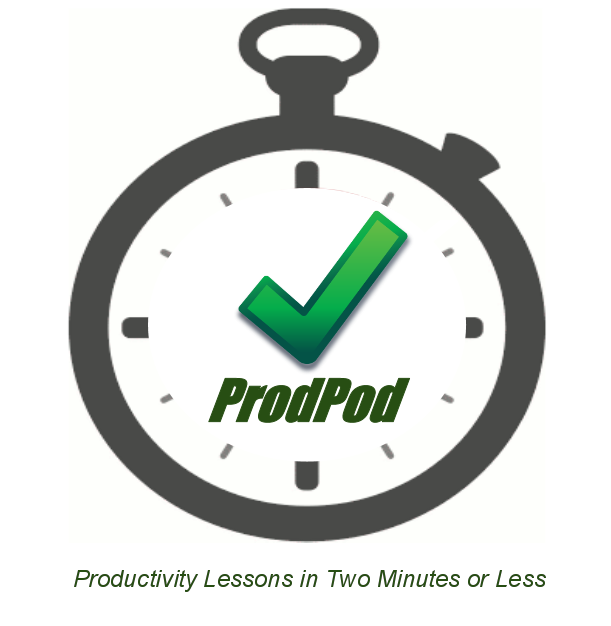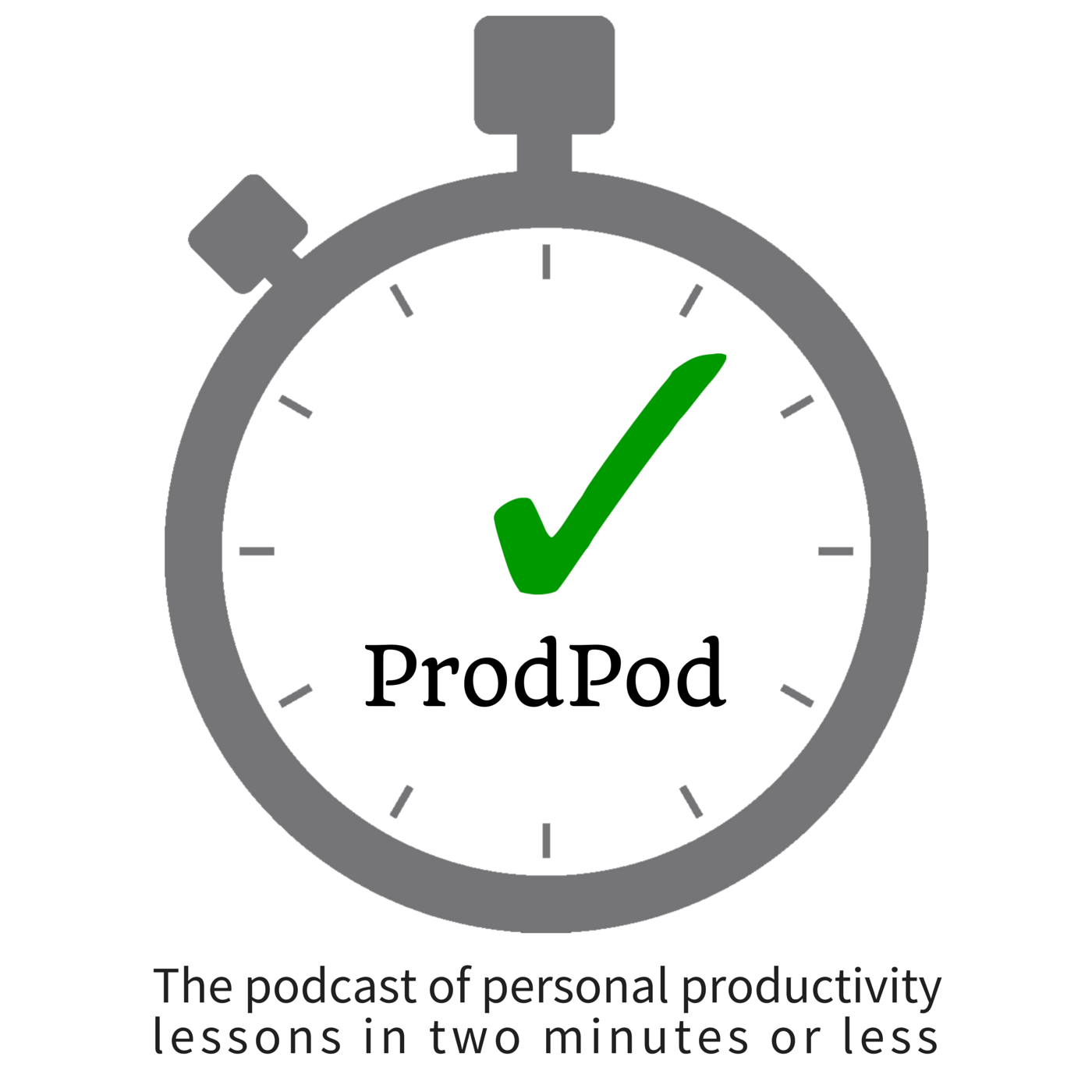Episodes

Tuesday Oct 18, 2011
ProdPod: Episode 21 -- How to Worry Less
Tuesday Oct 18, 2011
Tuesday Oct 18, 2011
First: If you do worry a lot, there is probably a good reason why you began worrying often between adolescence and young adulthood. I'm not going to be able to help you much in that regard, but to say that some introspection is in order. If you find the source of your worry, you can address it and let it go.
Second: Emotions are easily swappable. So, with worry, all you need to do is use that energy to think about the problem not just about worrying. Specifically, I want you to think about what the worst thing is that could happen for whatever is the focus of your worry. Take yourself to that place momentarily and determine whether it's that big of a deal or not. Once you've gotten yourself adjusted to whether triage is needed or planning; that is, it is a big deal and you need to go into immediate action to stop damage to life and limb, or, it's possible to plan and act to reduce possible issues.
Third: If you've decided you can limit the catastrophe you're worrying about, go ahead and start doing the things that you can to make the outcome better for you. I'm not trying to say that everything is always going to turn out perfectly if you actively mitigate potential problems, but why sit around and worry knowing you could have done *something* to stave or halt problems from occurring? The very act of doing instead of ruminating limits your mind's ability to actually worry.

Tuesday Oct 11, 2011
Tuesday Oct 11, 2011
In this episode, I describe my unfortunate relationship with the definition of the word "savings" for many years and what it taught me about productivity.
When I was in my late teens and was into reading books on financial literacy, I learned along the way a peculiar definition of "savings." Savings, according to this definition, is the deprivation of something now for later benefit. I struggled for many years of swallowing the idea of depriving myself, since savings was a positive tactic in financial strategy books I read. Savings was supposed to help you feel safe and pacify you about the uncertainty of life, not something that was scary and made you think of scarcity in your everyday life. I learned many years later that the true lesson of my unfortunate relationship with the definition of savings was that self-control, discipline and habits are inherently positive and deprivation was not the right choice of words. It wasn't until I read Steven Covey's 8th Habit when he discussed the concept of discipline as freedom, that I broke this negative association with the word savings. What those financial strategy books were trying to explain but never quite expressed was that a productive life means having the self-control to determine your own path--past, present and future. I mean that by understanding and guiding one's experiencing self and remembering self, you build a skill to build a life of fulfillment. It wasn't about a mass of money I'd put out of reach so that I'd miss rich life experiences only to be able to afford to keep up with the cost of living when I'm old and fully gray. It was even more than the adage "a penny saved is a penny earned"...it was that small habits of planned giving and taking make huge positive impacts long-term. This lesson has always been intensely motivating and I use it regularly to remind me that it's not about doing more with less, but doing more begets more and doing less begets less and both are useful tools.
I HOPE YOU ENJOYED THIS EPISODE OF PRODPOD. THIS IS RAY SIDNEY-SMITH AND THANKS FOR LISTENING! HERE'S TO YOUR PRODUCTIVITY SUCCESS...IN TWO MINUTES OR LESS.

Tuesday Oct 04, 2011
ProdPod: Episode 19 -- SMART Goals for Project Planning
Tuesday Oct 04, 2011
Tuesday Oct 04, 2011
One of my favorite finds when it comes to project planning was the acronym SMART. It stands for specific, measurable, achievable, relevant and time-sensitive. Recently I've learned of additions to the acronym to make it SMARTER, to include evaluate and reassess to the SMART goal planning process.
I use the SMART criteria specifically during my planning phase of any project, for writing out my project descriptions thoroughly. For example, before I used SMART criteria for my goals, I would write a goal as: Increase company's third quarter revenue. Now, using the SMART goal format, the revised goal is written as: Empower sales managers to implement our sales/marketing plan to increase company's third quarter revenue by 15% in the southeast region to determine annual bonuses, by dedicating one day of every week to the team.
By its face, it's certainly much longer than the original, but more importantly, the detail with which the goal is defined, it allows me to view my Projects list with no question about the mission, vision and general action plan for how I'm going to complete this project. It answers the questions of why, what and how, so you can get to work, motivated and ready for action. I hope writing SMART goals becomes a useful tool (and regular productive habit) for you in getting more of your important, not-urgent projects accomplished.

Thursday Sep 29, 2011
ProdPod: Episode 18 -- Someday or Maybe?
Thursday Sep 29, 2011
Thursday Sep 29, 2011
A "Someday/Maybe" list, according to David Allen's Getting Things Done (or GTD) methodology is for any goal, project or next action that you are not committed to achieving or doing right now. Many people have struggled to separate what goes on their Someday/Maybe lists from their Actions and Projects lists, so I thought in this episode I'd describe Someday/Maybe's in my productivity system in hopes that it helps others.
I distinguish between someday's and maybe's. Someday's I *will* do. Maybe's maybe not. For someday's I always put parenthetically after the description "Resources Needed/Wanted:" which asks the question: what would I need or want to happen that would trigger me to do this someday item right now? For me, this makes someday's realistic and available for when that "missing link" becomes available, whether that's time, money, emotional energy to invest, credentials, a new delegatee, a call from my mother, or so on.
So, in practical terms, I use two context lists to manage the various someday/maybe's in my life and work. This puts an intrinsic greater importance on somday's than on maybe's, so I typically review someday's every week during my Weekly Review. Whereas, my maybe's are items that I plan to review at least quarterly, but most of the time I come across the list monthly when I find the mental-emotional energy and time to think about my maybe's list. By its nature, they end up being somewhat of a wishlist of things I'd like to accomplish but haven't yet figured out how to accomplish, but with a little creativity I can make them a someday or perhaps even an actual project or next-action.
This is just one modification of many to GTD that I've implemented in my own personal productivity system, and it benefits me by allowing me to move stuff to definable goals without cluttering my active projects or next-actions lists with yet-to-be-productive items.

Tuesday Sep 06, 2011
Tuesday Sep 06, 2011
Two-Minute Book Summary: Who Moved My Cheese? An Amazing Way to Deal With Change in Your Work and in Your Life Dr. Spencer Johnson
Dr. Spencer Johnson wrote and published his NY-Times-5-years-running bestselling book, Who Moved My Cheese? An Amazing Way to Deal With Change in Your Work and in Your Life, in 1998. I read this oft-cited business fable back in 1999 or 2000 for the first time, and it represented a major change in my thinking about my life, and specifically my productivity. Dr. Johnson uses "cheese" to represent happiness and success, whereas I substituted his definition for my highly productive state called sometimes "flow."
The gem of the book arrives near the end of the book when one of the four characters, after facing the root of change avoidance: fear. He writes on a wall these words of wisdom...
Change Happens
They Keep Moving The Cheese
Anticipate Change
Get Ready For The Cheese To Move
Monitor Change
Smell The Cheese Often So You Know When It Is Getting Old
Adapt To Change Quickly
The Quicker You Let Go Of Old Cheese, The Sooner You Can Enjoy New Cheese
Change
Move With The Cheese
Enjoy Change!
Savor The Adventure And Enjoy The Taste Of New Cheese!
Be Ready To Change Quickly And Enjoy It Again
They Keep Moving The Cheese.
Final thoughts: Who Moved My Cheese is a great book and worth the read.

